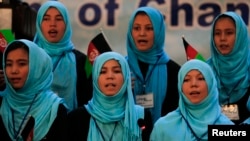Afghanistan's Education Ministry is facing fierce criticism for banning girls over 12 years of age from singing the national anthem in mixed gender gatherings.
The order, dated March 6, came to light Wednesday when someone took a picture of the notice circulated to educational institutions and posted it on social media.
The Afghanistan Independent Human Rights Commission (AIHRC), the nations official human rights body, called it a violation of children's rights, the constitution, and international conventions.
“The right to education, freedom of expression and access to artistic skills is a fundamental right of all children, without discrimination based on age or sex. All boys and girls can enjoy their rights equally and freely within the law,” AIHRC said on its official Twitter account.
Roya Ahmedi, a 17-year-old high school student in Kabul, is a member of her high school’s band.
“When I heard this news from social media, it was very disappointing for me because this decision was taken by an organization where a woman is the determiner (decision maker),” she said.
She was referring to Afghanistan’s Acting Education Minister Rangina Hamidi.
Ahmedi added that one’s “vision and whatever we love” was far more important than one’s gender.
“I love to be the women’s sound,” she said.
Social media in Afghanistan was full of criticism over the decision. One Twitter user, Marjan Mateen, uploaded a 2019 clip of schoolgirls singing the national anthem in a grand ceremony. Joining them on stage were several rows of men in uniform.
“We failed you! I am sorry,” Mateen’s tweet said.
Dr. Ahmad Sarmast, founder of Afghanistan National Institute of Music, said the announcement “shocked the nation.”
Najiba Arian, a spokesperson for the Education Ministry, confirmed the ban and said the decision was a result of requests from parents.
She said after a year of COVID-related school closures, parents wanted their children to focus on education rather than singing.
Acting Minister Hamidi, who took over in June of last year, holds a bachelor’s degree from the University of Virginia in the United States and sits on the advisory boards of such organizations as Open Society Afghanistan, Afghan Women Chamber of Commerce and Industries, and the Afghan Institute for Civil Society.
After taking over, she moved to merge the Islamic studies department of the ministry with several others, causing a severe backlash from religious circles. Eventually, she was forced to reverse the decision but some in Afghanistan think her move may be an effort to appease the religious crowd.
She is also under pressure politically to resign, after she failed to get a vote of confidence from the Afghan parliament in December. The vote was needed to move her from an acting minister to a full minister status.




